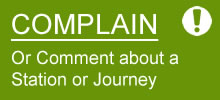
What Is Proposed?
SENRUG believes both local and long-distance rail fares should be significantly simplified. For local journeys (possibly excluding local journeys on long-distance trains) rail fares should be integrated with Metro and bus fares and charged on the basis of the number of zones passed through. Fares on long-distance trains should be simplified, with restriction conditions easier to understand, and the price of tickets purchased “on the day” for lightly used trains significantly reduced.
Why?
SENRUG believes the current fares system is much too complicated. Passengers making local journeys should be charged by zone and not by the type of public transport used, not having to pay again if they are forced to switch the way they travel due to disruption or delays. Additionally, many long-distance passengers are put off from travelling by train because fares are perceived to be significantly higher than the actual cost of Advance Tickets booked well in advance.
Whilst SENRUG understands long-distance Train Companies will want to offer cheaper fares for less busy trains, which is a valuable means of managing congestion, SENRUG does not accept such tickets must be purchased in advance. SENRUG believes this is unfair to those obliged to travel at late notice eg to visit a sick relative, and is like a tax on misery.
SENRUG also believes a simpler, more transparent fares system will make train travel more attractive and enable Train Companies to avoid the negative perceptions many passengers now have of low cost airlines.
How?
For local journeys within the North East Mayoral region, fares on Northern and TransPennine Express trains should be brought within the POP smart card system, which already includes the Metro, Shields Ferry and buses within the Newcastle area. Bus journeys throughout the North East Mayoral region should additionally be added to the POP card system.
For long-distance rail journeys, SENRUG recommends that for any rail journey, there should be 3, and only 3 fares for each class of travel. SENRUG proposes these should be called Red, Amber and Green, with Red being the cheapest but severely restricted tickets, Amber being mid price range but with some restrictions, and Green being fully flexible but more expensive tickets.
Type of Ticket |
Restriction |
RED |
BOOKED TRAIN ONLY |
AMBER |
LIMITED RANGE OF TRAINS, LIMITED OPERATORS, LIMITED RANGE OF DATES |
GREEN |
ANY TRAIN, ANY OPERATOR, ANY DATE* |
* within validity period of ticket
To support the simplification of the fares system outlined above, we believe a number of fare guarantees should also be introduced. If a rail company breaks one of these guarantees then they should be obliged to issue an instant cash refund of the fare paid to the customer.
Guarantee 1 |
All tickets to be sold as singles, which should be 50% of the return fare |
Guarantee 2 |
It should never be cheaper to buy 2 tickets for a journey on a single train (eg Morpeth to York) |
Guarantee 3 |
It should never be cheaper to buy a ticket for beyond the station you are travelling to and get off at an earlier stop |
Guarantee 4 |
Maximum of 3 fares only per class for any journey (RED, AMBER, GREEN) |
Guarantee 5 |
Railcard discounts must be available on all fares subject only to minimum ticket price |
The Train Operators could either introduce such a system voluntarily working through an umbrella organisation such as RDG (The Rail Delivery Group), or the Department For Transport could specify the system and require Train Companies to comply with it as part of their franchise commitment.
In September 2018 SENRUG submitted these proposals to the Railway Delivery Group (RDG) as part of the Transport Focus / RDG Easier Fares Consultation. See SENRUG’s Consultation Response here.
Back to Our Campaigns








